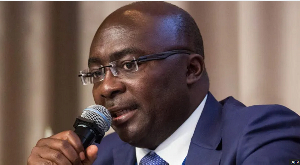The Natural Resources Governance Institute (NRGI), says a review of the benchmark revenue for petroleum would weaken the Petroleum Revenue Management Act (PRMA)
The PRMA is currently before parliament for amendment, however, the NGO says a revision in practice means that the government could alter the spending and saving strategy in a given year.
The amendment of most concern is a change that allows revisions to the “benchmark revenue” figure when the Minister of Finance deems there has been a “gross over-projection or under-projection” (Amendment 7)
A news data analysis by the Ghana News Agency on the amendment, revealed that the amendments proposed introduces a process that complicates both deposits and withdrawal rules around funds and appear to create conflicts in the act.
Benchmark revenue is the estimated projection of monies expected from the oil extraction by the Ministry of Finance.
Mr Mark Evans, African Economic Analyst at the NRGI said that reviewing of the benchmark revenue meant that government could alter spending or saving strategy in a given year.
The Africa Centre for Energy Policy (ACEP) together with other non-governmental organisations have proposed an Independent Certifier to certify the benchmark revenue estimated by the Minister of Finance.
The NGOs expressed believe that the suspicion that government could deliberately over estimate crude oil prices would be high should the Executive be given the power to review the benchmark revenue.
They said that could promote lack of transparency with regards to how the oil revenue is used.
In a proposal jointly submitted by ACEP, Centre for Public Interest Law and Friends of the Nation, to the Ministry of Finance, they recommended that the use of an independent committee to set the benchmark revenue would work well for the nation's interest.
In March, the Minister of Finance announced an amendment to the Petroleum Revenue Management Act.
He said the amendment was necessary to ensure that the Ghana Petroleum Fund received revenue whether or not the annual budget funding met its ceiling amount.
Mr Seth Terpker said in accordance with clause 7 of the PRMA recommended to parliament a revision of the benchmark revenue , arguing that it had become evident that there was unexpected petroleum price movement or production conditions, which had resulted in a gross over projection or under projection of the benchmark revenue.
The Minister alluded to the inconsistency in the calculation of the petroleum benchmark revenue.
Total petroleum receipt for 2015 is estimated 1.5 billion cedis (1.1 per cent of the GDP) compared with the 2015 budget estimate of 4.2 billion cedis (3.1 per cent of the GDP) the difference is 2.7 billion (64.4 per cent) lower than the 2015 budget target of the projected total petroleum receipt.
Business News of Friday, 22 May 2015
Source: GNA
NGO kicks against bench mark review of petroleum
Entertainment
















